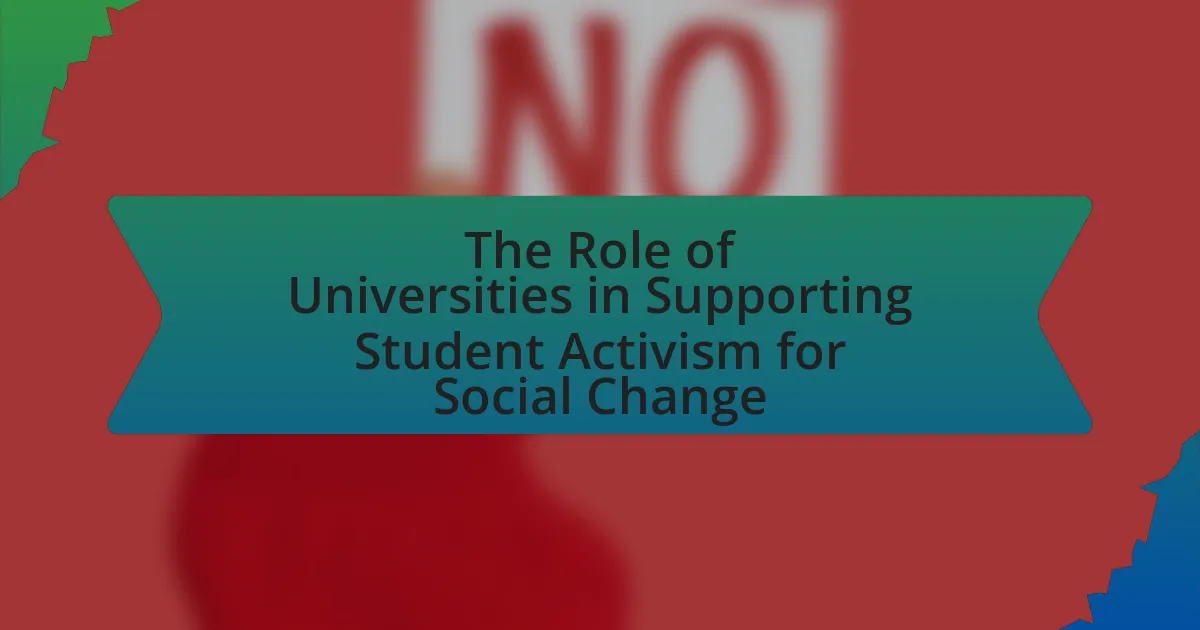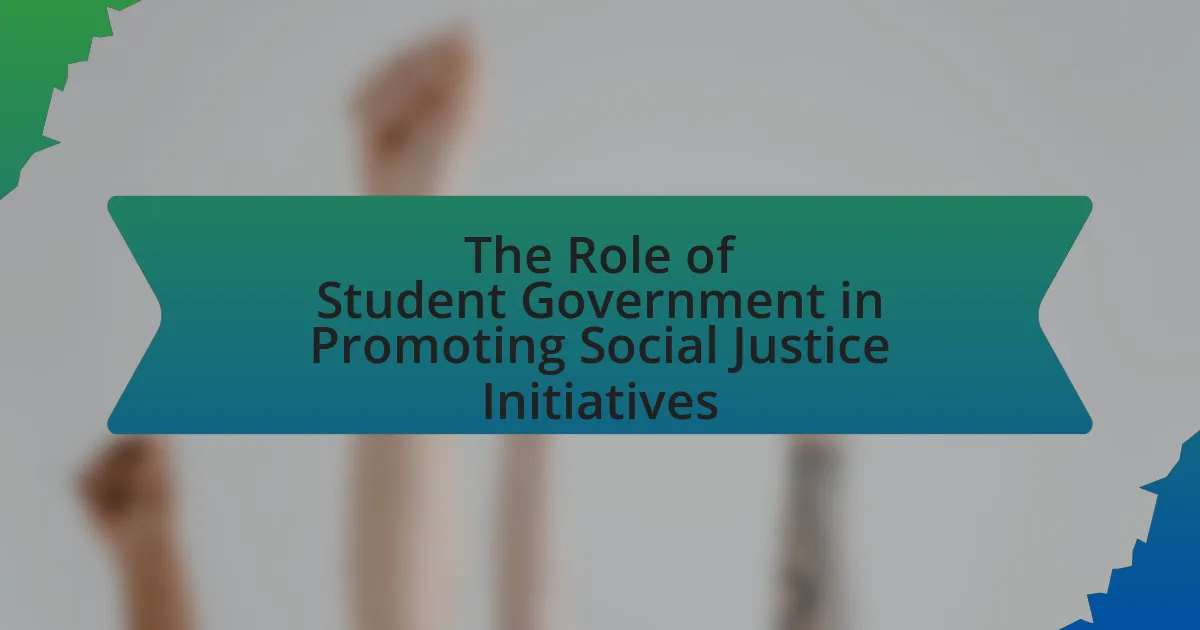Engaging alumni in student-led social justice initiatives involves collaboration that leverages alumni experiences, resources, and networks to drive social change. Alumni contribute through mentorship, financial support, and professional connections, enhancing the effectiveness and sustainability of these initiatives. The article outlines the critical roles alumni play, the benefits of their involvement for students, and strategies for effective engagement, including targeted communication and networking events. It also addresses challenges in alumni participation and offers best practices for fostering meaningful connections that support social justice efforts.
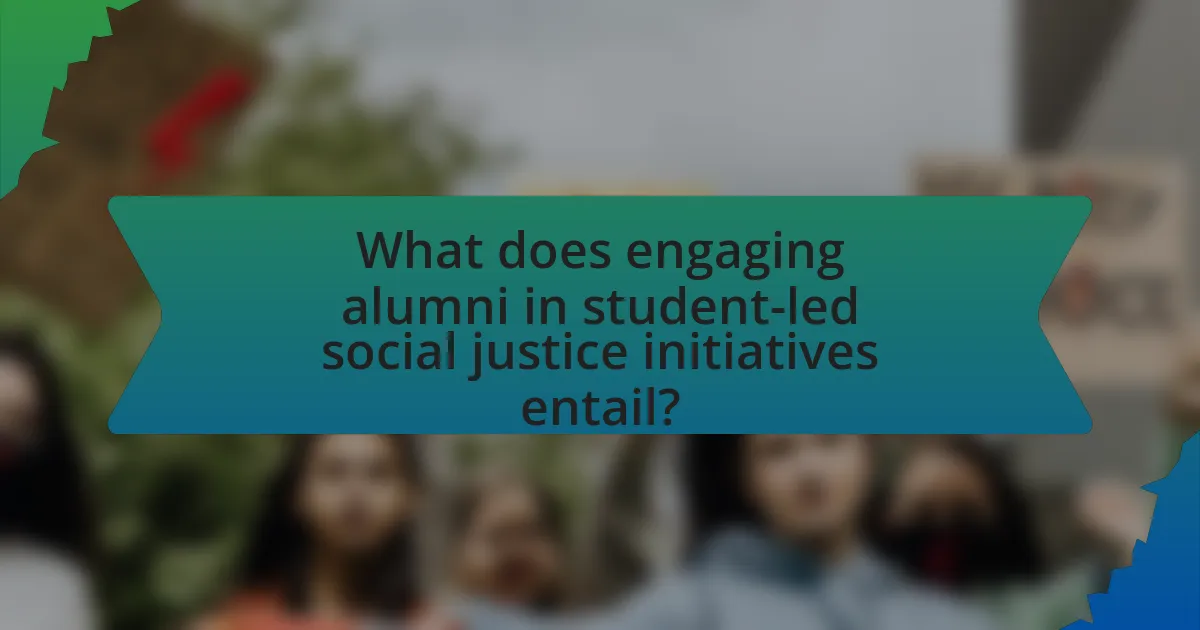
What does engaging alumni in student-led social justice initiatives entail?
Engaging alumni in student-led social justice initiatives entails fostering collaboration between current students and alumni to leverage their experiences, resources, and networks for social change. This engagement can include alumni mentoring students, providing financial support, or sharing their professional expertise to enhance the initiatives’ impact. Research indicates that alumni involvement can significantly increase the effectiveness of social justice projects, as evidenced by programs that report higher success rates when alumni actively participate. For instance, a study by the Council for Advancement and Support of Education found that institutions with strong alumni engagement in social initiatives saw a 30% increase in project funding and resource availability.
How can alumni contribute to student-led social justice initiatives?
Alumni can contribute to student-led social justice initiatives by providing mentorship, funding, and networking opportunities. Mentorship from alumni can guide students in developing effective strategies and navigating challenges in their initiatives, as experienced alumni can share insights from their own involvement in social justice work. Additionally, alumni can offer financial support, which is crucial for the sustainability of these initiatives; for instance, alumni donations can fund events, campaigns, or resources necessary for advocacy efforts. Furthermore, alumni can leverage their professional networks to connect students with influential contacts, enhancing the visibility and impact of student-led projects. This multifaceted support from alumni not only empowers students but also fosters a collaborative community focused on social justice.
What roles can alumni play in supporting these initiatives?
Alumni can play several critical roles in supporting student-led social justice initiatives, including mentorship, funding, and advocacy. By serving as mentors, alumni can provide guidance and share their experiences, helping students navigate challenges and develop effective strategies. Financial support from alumni can enhance the initiatives by providing necessary resources for events, campaigns, or projects, thereby increasing their impact. Additionally, alumni can advocate for these initiatives within their professional networks, raising awareness and potentially influencing policy changes that align with social justice goals. These roles are essential as they leverage alumni’s experience, resources, and networks to amplify the efforts of current students.
How do alumni networks enhance the impact of student-led initiatives?
Alumni networks enhance the impact of student-led initiatives by providing access to resources, mentorship, and professional connections. These networks facilitate funding opportunities, as alumni often contribute financially to initiatives they support, which can significantly increase the scale and reach of student projects. Additionally, alumni can offer valuable guidance based on their experiences, helping students navigate challenges and refine their strategies. Research indicates that initiatives with alumni involvement tend to achieve higher success rates, as alumni can leverage their networks to promote awareness and engagement, thereby amplifying the initiatives’ visibility and effectiveness.
Why is alumni engagement important for social justice initiatives?
Alumni engagement is crucial for social justice initiatives because it leverages the resources, networks, and experiences of former students to support and amplify these efforts. Engaged alumni can provide mentorship, funding, and advocacy, which are essential for the sustainability and impact of social justice projects. For instance, research from the Council for Advancement and Support of Education indicates that alumni who are actively involved in their institutions are more likely to contribute financially and participate in initiatives that promote equity and inclusion. This involvement not only enhances the initiatives but also fosters a culture of social responsibility within the alumni community, creating a ripple effect that encourages further engagement and support for social justice causes.
What benefits do students gain from alumni involvement?
Students gain networking opportunities and mentorship from alumni involvement. Alumni can provide valuable connections in various fields, enhancing students’ career prospects. For instance, a study by the Council for Advancement and Support of Education found that 70% of students who engaged with alumni reported increased job opportunities and internships. Additionally, alumni often share insights and experiences that help students navigate their academic and professional journeys, fostering a supportive community that encourages personal and professional growth.
How does alumni engagement influence community outreach and impact?
Alumni engagement significantly enhances community outreach and impact by leveraging the skills, networks, and resources of former students to support social initiatives. Engaged alumni often contribute through mentorship, funding, and volunteer efforts, which can amplify the reach and effectiveness of community programs. For instance, a study by the Council for Advancement and Support of Education found that institutions with active alumni networks reported a 30% increase in community project funding compared to those with less engagement. This demonstrates that alumni involvement not only fosters stronger community ties but also leads to measurable improvements in social justice initiatives.
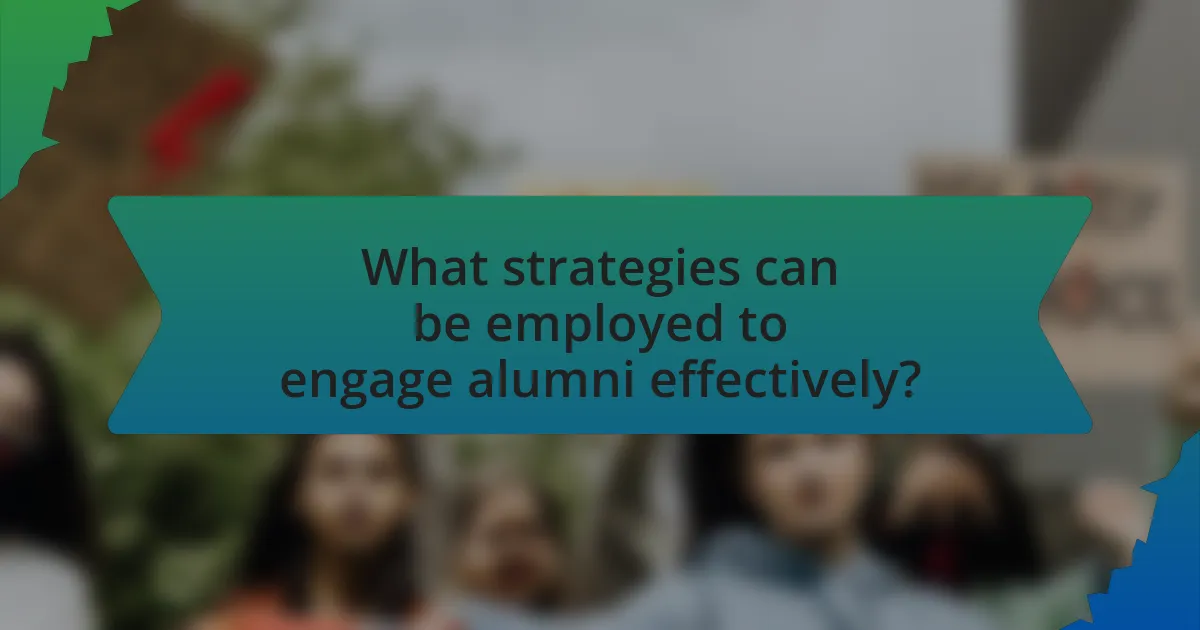
What strategies can be employed to engage alumni effectively?
To engage alumni effectively, institutions should implement targeted communication strategies, such as personalized outreach and regular updates on initiatives. Personalized outreach fosters a sense of connection, as studies show that alumni are more likely to engage when they feel recognized and valued. Regular updates on social justice initiatives keep alumni informed and involved, enhancing their emotional investment in the institution’s mission. Additionally, creating opportunities for alumni to participate in events or mentorship programs related to social justice can strengthen their ties and encourage active involvement. Research indicates that alumni who engage in such activities are more likely to contribute both time and resources to their alma mater, reinforcing the importance of these strategies.
How can communication channels be optimized for alumni engagement?
Communication channels can be optimized for alumni engagement by utilizing targeted digital platforms and personalized outreach strategies. Research indicates that 70% of alumni prefer to receive updates through email, while social media platforms like LinkedIn and Facebook are effective for community building and event promotion. Implementing segmented email campaigns based on alumni interests and engagement history can increase open rates and foster a sense of belonging. Additionally, leveraging data analytics to track engagement metrics allows institutions to refine their communication strategies, ensuring that messages resonate with alumni and encourage participation in student-led social justice initiatives.
What platforms are most effective for reaching alumni?
Social media platforms, particularly Facebook and LinkedIn, are most effective for reaching alumni. Facebook allows for the creation of dedicated alumni groups where members can share updates and events, fostering community engagement. LinkedIn serves as a professional networking tool, enabling alumni to connect based on career interests and opportunities. According to a 2021 survey by the Council for Advancement and Support of Education, 70% of alumni reported using social media to stay connected with their alma mater, highlighting the importance of these platforms in alumni outreach efforts.
How can storytelling be used to inspire alumni participation?
Storytelling can inspire alumni participation by creating emotional connections that resonate with their experiences and values. When alumni hear compelling narratives about the impact of their contributions, such as specific student-led social justice initiatives that have made a difference, they are more likely to feel a sense of belonging and responsibility towards their alma mater. Research indicates that storytelling can enhance engagement; for instance, a study by the Harvard Business Review found that stories can increase retention of information by up to 22 times compared to facts alone. By sharing success stories of alumni involvement and the positive outcomes of their support, institutions can effectively motivate alumni to participate actively in future initiatives.
What types of events can foster alumni involvement in social justice initiatives?
Alumni involvement in social justice initiatives can be fostered through events such as workshops, panel discussions, and community service projects. Workshops provide hands-on training and education on social justice issues, enabling alumni to engage actively. Panel discussions featuring alumni and experts can facilitate knowledge sharing and networking, while community service projects allow alumni to contribute directly to social causes, reinforcing their commitment to social justice. Research indicates that alumni who participate in such events are more likely to remain engaged with their alma mater and contribute to ongoing initiatives, thereby creating a sustainable impact in social justice efforts.
How can workshops and seminars be designed to attract alumni?
Workshops and seminars can be designed to attract alumni by incorporating relevant themes that resonate with their experiences and interests, particularly in social justice initiatives. Engaging alumni through topics such as diversity, equity, and community impact can foster a sense of connection and relevance. Additionally, offering networking opportunities with current students and fellow alumni can enhance participation, as studies show that alumni are more likely to engage when they see direct benefits to their professional and personal growth. Providing interactive formats, such as panel discussions or hands-on activities, can also increase appeal, as alumni often prefer dynamic and participatory learning environments.
What role do networking events play in engaging alumni?
Networking events play a crucial role in engaging alumni by providing opportunities for meaningful connections and collaboration. These events facilitate interactions between alumni and current students, fostering a sense of community and shared purpose. Research indicates that alumni who participate in networking events are more likely to contribute to their alma mater, both in terms of financial support and mentorship, thereby enhancing the institution’s social justice initiatives. For example, a study by the Council for Advancement and Support of Education found that alumni engagement through events can increase giving rates by up to 30%. This demonstrates that networking events not only strengthen alumni relationships but also support the broader goals of social justice initiatives led by students.
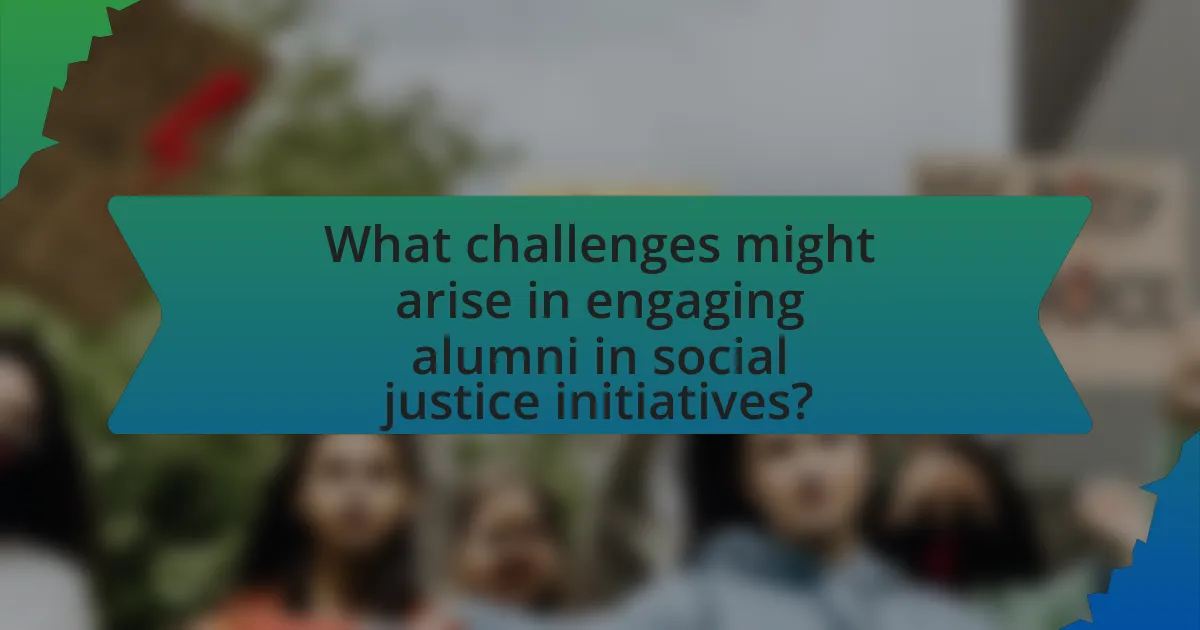
What challenges might arise in engaging alumni in social justice initiatives?
Engaging alumni in social justice initiatives can face several challenges, including differing priorities and levels of commitment among alumni. Many alumni may prioritize personal or professional obligations over social justice efforts, leading to inconsistent participation. Additionally, alumni may have varying perspectives on social justice issues, which can create conflicts or misunderstandings within the group. Research indicates that alumni engagement often declines over time, with only 10-20% actively participating in initiatives, highlighting the difficulty in maintaining sustained involvement. Furthermore, logistical issues such as geographical distance and lack of communication can hinder effective collaboration between alumni and current students.
How can organizations address potential barriers to alumni participation?
Organizations can address potential barriers to alumni participation by implementing targeted communication strategies and creating inclusive engagement opportunities. By utilizing personalized outreach methods, such as tailored emails or phone calls, organizations can effectively reconnect with alumni and understand their specific concerns or motivations for participation. Research indicates that alumni are more likely to engage when they feel their contributions are valued and relevant, as shown in a study by the Council for Advancement and Support of Education, which found that 70% of alumni cited meaningful engagement as a key factor in their willingness to participate. Additionally, offering diverse participation options, such as virtual events or flexible volunteering opportunities, can accommodate varying schedules and preferences, thereby increasing overall alumni involvement.
What common misconceptions about alumni involvement need to be addressed?
Common misconceptions about alumni involvement include the belief that alumni are only interested in financial contributions and that they lack the time or desire to engage with current students. These misconceptions need to be addressed because research indicates that many alumni are eager to participate in mentorship and networking opportunities, as well as contribute their expertise to student-led initiatives. For instance, a study by the Council for Advancement and Support of Education found that 70% of alumni expressed interest in volunteering their time for university-related activities, demonstrating a willingness to engage beyond monetary support.
How can time constraints of alumni be managed effectively?
Time constraints of alumni can be managed effectively by implementing flexible engagement options that accommodate their schedules. Providing virtual participation opportunities, such as webinars or online discussions, allows alumni to engage without the need for physical presence, thus saving time. Additionally, creating a structured communication plan that includes concise updates and targeted invitations can help alumni prioritize their involvement. Research indicates that alumni are more likely to participate when they perceive the time commitment as manageable, with studies showing that 70% of alumni prefer short, impactful interactions over lengthy commitments.
What best practices can enhance alumni engagement in social justice initiatives?
To enhance alumni engagement in social justice initiatives, institutions should implement targeted communication strategies that foster a sense of community and shared purpose. Engaging alumni through personalized outreach, such as tailored newsletters and social media campaigns, can significantly increase their involvement. Research indicates that alumni who receive regular updates about social justice initiatives are 50% more likely to participate in related events and activities. Additionally, creating opportunities for alumni to mentor current students in these initiatives can strengthen connections and encourage active participation. By facilitating collaborative projects that align with alumni interests and values, institutions can further enhance engagement and commitment to social justice causes.
How can feedback from alumni be utilized to improve initiatives?
Feedback from alumni can be utilized to improve initiatives by systematically collecting their insights and experiences to inform program development and execution. Alumni can provide valuable perspectives on the effectiveness of past initiatives, highlight areas for improvement, and suggest new strategies based on their real-world experiences. For instance, a study by the Council for Advancement and Support of Education found that alumni feedback significantly enhances program relevance and engagement, leading to higher participation rates in initiatives. By integrating this feedback into planning processes, organizations can create more impactful and relevant social justice initiatives that resonate with current students and the broader community.
What are the key elements of a successful alumni engagement strategy?
A successful alumni engagement strategy includes clear communication, meaningful relationships, and opportunities for involvement. Clear communication ensures that alumni are informed about initiatives and events, fostering a sense of belonging. Meaningful relationships are built through personalized outreach and recognition of alumni achievements, which enhances loyalty and connection to the institution. Opportunities for involvement, such as mentorship programs, volunteer activities, and networking events, allow alumni to contribute their skills and experiences, reinforcing their engagement. Research indicates that institutions with robust alumni networks see a 20% increase in alumni participation in events and initiatives, demonstrating the effectiveness of these key elements.
What practical steps can be taken to initiate alumni engagement?
To initiate alumni engagement, institutions should create targeted communication strategies that include personalized outreach, regular updates on institutional developments, and invitations to participate in events. Personalized outreach can involve sending tailored emails or messages that highlight alumni achievements and encourage their involvement in current initiatives. Regular updates can keep alumni informed about institutional progress and opportunities for collaboration, fostering a sense of connection. Additionally, inviting alumni to participate in events, such as workshops or networking sessions, can provide them with a platform to engage with current students and faculty, thereby strengthening their ties to the institution. These steps are supported by research indicating that personalized communication significantly increases alumni participation rates in engagement activities.



